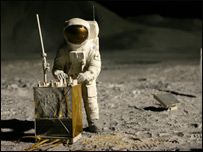 |
| Take Away English 随身英语 |
 |
|
“随身英语”,让你随时随地感受英国时尚生活,第一时间了解流行文化,并提供词汇、语音、语法及听力阅读练习,既方便在线学习,也可供随意下载。随身英语,学习英语新潮流! |
|
Return to the Moon 返回月球
[ 2006-08-30 08:00 ]
 在线收听短文 在线收听短文
 |
| An astronaut stands on the surface of the Moon |
Scientists in the UK have expressed their enthusiasm for China’s plans to explore the Moon withrobotic spacecraft, and are keen totake partin the adventure.
British scientists areseekingtocollaboratewith their Chinesecounterpartson the Cheng’e programme. This four-phase programme could see the return ofastronautsto the moon’s surface for the first time since the Apollo 17 mission in 1972.
Tiesbetween the Chinese and UK space community have been strengthened since a visit to China made by a team of Britishacademics, agency officials, and space scientists earlier this year. At that time discussions took place regarding the UK buildingscientific instrumentsfor the second phase of China’slunar missions.
One British academic whoparticipatedin the discussions, Professor John Zarnecki of the Open University said, "I think they are looking for significant collaboration. They have got good technology themselves but they will admit that they are fairly new in space science; so they don't have all of the instrument capabilities and so on."
China has already established itself as the third space superpower, having successfully launched twomanned spaceflights– last year two Chinese astronauts spent five daysin orbitbefore safely returning to Earth. But China’s space ambitions don’t stop there. As well as alunar landing, plans are being made to set up a permanentspace station.
The UK, on the other hand, has had a more modest space programme. Only a handful of Britons havebroken freeof the Earth’s atmosphere. Most recently, UK-born astronaut, Piers Sellers, spent thirteen days on board the American space shuttle Discovery.
However, British space exploration has not always gone according to plan. The Beagle 2probeto Marsdisappeared without a traceon Christmas Day 2003.
|